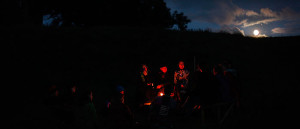
The night is black all around. The ‘supermoon’ is rising over the loch behind us. The damp air is on our backs. But our faces are warmed by the fire. The talk, drifting over the flames, is about mortality.
This is the EAFS ‘off grid’ environmental festival, where artists, writers, makers and dreamers of dreams have gathered for a weekend at Morton Castle, Dumfriesshire. The pace is leisurely. The people are smiling. And there is plenty of time for conversation.
Tonight’s event is a series of ‘curated’ discussions around open fires. Ours is the death campfire. The idea is based on the death café. That means no goal setting, no flip charts, no suggested themes, no action points. Just a group of people, listening carefully, respecting a bit of silence, and sharing their thoughts.
The fire serves a real purpose beyond the feeling of warmth. We gaze into it as others speak.We speak into it as others listen. Occasionally someone gets up to put on more logs. As the sparks fly up, the talk takes new turns, spiralling round and into the night, where the Dumfriesshire sky is a Milky Way tablecloth. Orion stands over us, eavesdropping.
Tonight there is much to hold his attention. To begin, most of those who speak turn Woody Allen on his head. They don’t fear dying; it’s being dead that bothers them. Some think about it a good deal. Does life go out, like the fire? Or are we re-born into something new?
That takes us to whether we have the right to make ourselves dead, to end our own lives. There is a tussle between autonomy and connectedness. The latter seems to gain the upper hand. Preventing suicide is deemed a good thing. But others are not so sure and admit they have thought of it themselves, or contemplated the services of Dignitas, in Switzerland.
We learn of an old man, with little to live for, who has collected together some portable barbecues. They sit incongruously in his living room. A route out. Approaching 90 he makes a new friend. He brightens, gets out of the house again. One day the barbecues have gone. He doesn’t need them anymore.
What does our dying do to the environment? Coffins, crematoria, hearses are agreed to be polluting things. There is a whimsical agreement that green burial is good, but the opportunities are few. We should tread lightly on the earth, and like EAFS #offgrid, try to leave no harmful trace behind.
There is laughter too. We hear about a few ‘Darwin Awards’ deaths. People who die in improbably crazy circumstances of their own making or blundering. We talk about funeral crashing and the film Harold and Maude, and describe the humour in our own relatives as they’ve neared the end of their lives.
Someone speaks from the darkness beyond the fire. Then halts. The resulting pause is filled by the occasional exhalation of breath. The conversational will of our group is starting to ebb.
We draw things to a close. Some people drift away. New folks turn up, wondering how our campfire has gone. We break up into twos and threes and chat. There are handshakes and thanks. Even photographs.
I turn to walk back up the hill, slightly drained by the candour of the night. But astonished again at how easy it can be to talk about death.
David Clark, with thanks to all our friends at Environmental Art Festival Scotland




[…] joined a Q&A session with a discussion ranging from workforce planning to the idea of the fireside death cafe, to the relationship between palliative care and assisted […]